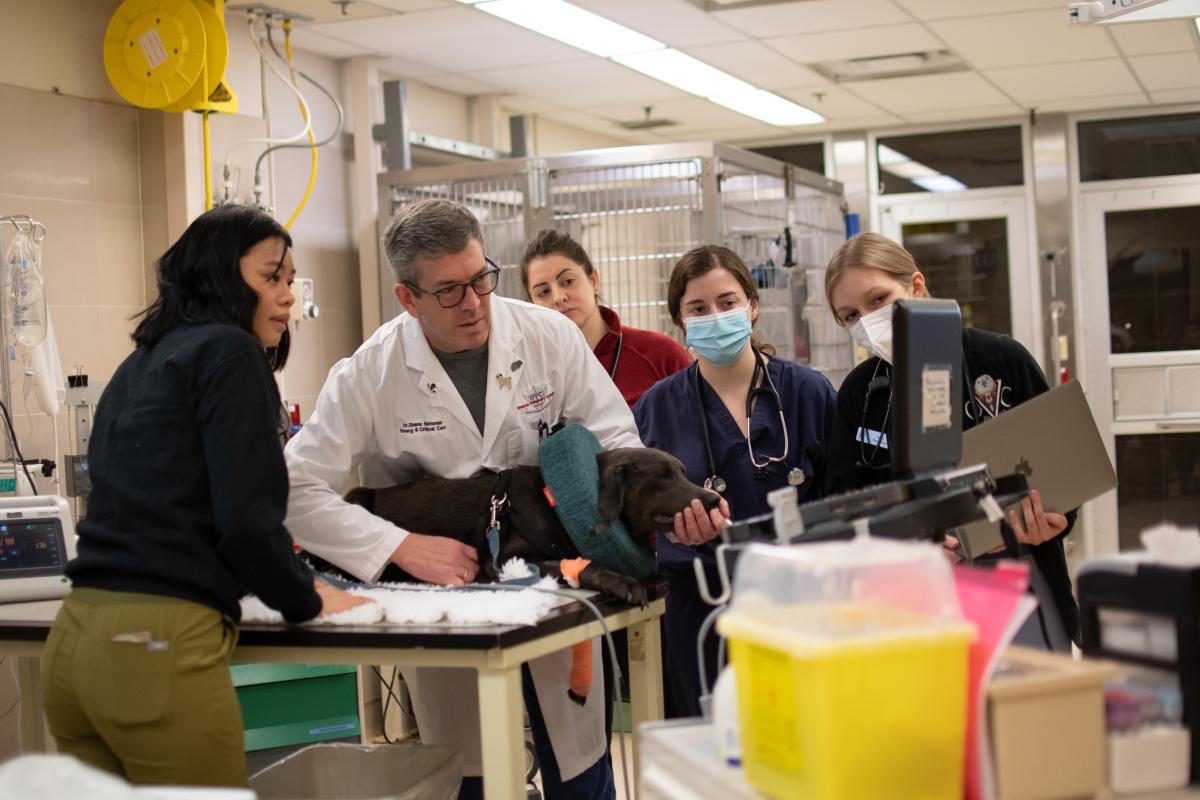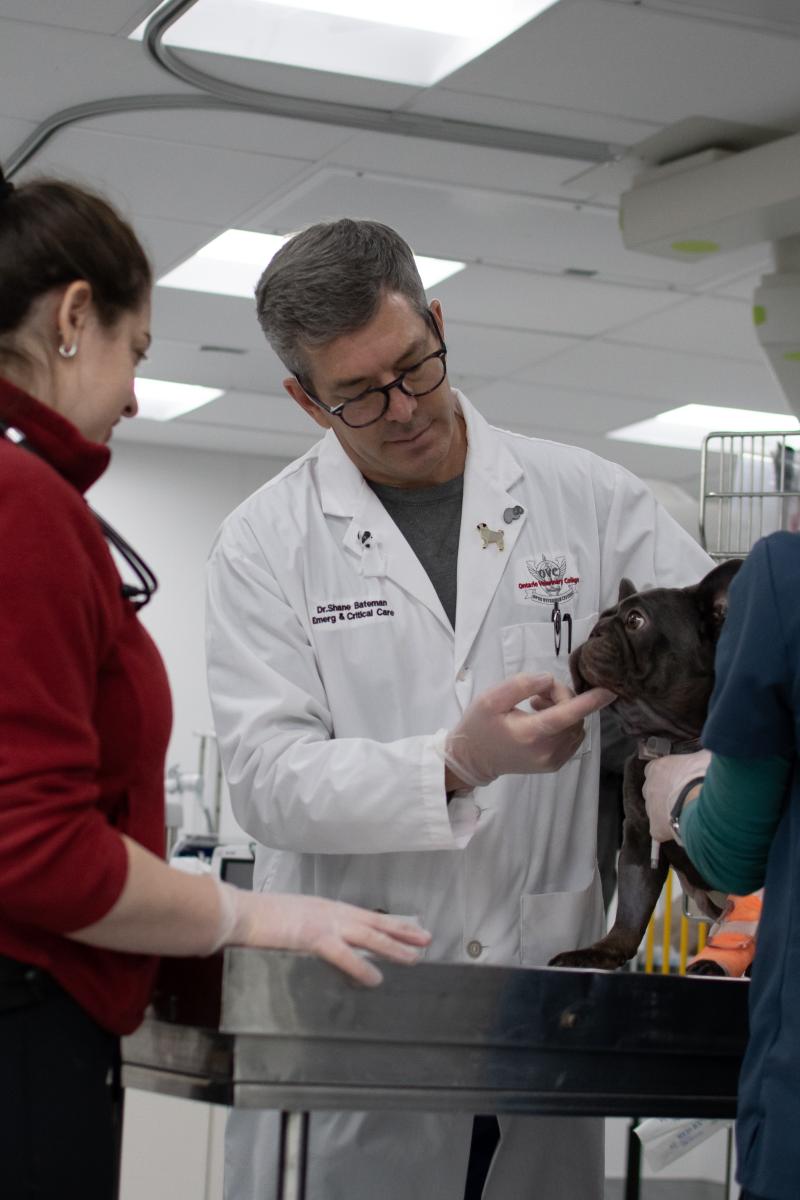Dr. Shane Bateman is an Associate Professor and Critical Care Specialist in the Department of Clinical Studies at the Ontario Veterinary College (OVC). We interviewed him for the Spring/Summer 2023 edition of Best Friends.
Get to know Dr. Bateman below!
 Why did you pursue a career in veterinary medicine and then go on to specialize as a veterinary criticalist?
Why did you pursue a career in veterinary medicine and then go on to specialize as a veterinary criticalist?
I grew up on a beef ranch in southern Alberta and I was constantly around animals as a child. After vet school, I worked in general practice in Nova Scotia and Alberta for about two years, which is when I decided to apply for an internship at OVC. Originally, it was my intent to specialize in small animal surgery, which did not end up working out. But, in every cloud there is a silver lining; after my internship, I had a job lined up at an emergency practice when I got a phone call from Dr. Karol Mathews, who had recently created Canada’s first veterinary Intensive Care Unit (ICU) at OVC and was looking for a resident to join her program. I was accepted and became the first ever Emergency and Critical Care (ECC) resident in Canada – a position that was funded by OVC Pet Trust. Many of the same requirements of the job that originally attracted me to surgery were also important skills in ECC: hand-eye coordination, thriving in high-stress situations, and the constant mental challenge of complicated medical cases. I am a techie at heart, and the sophisticated equipment we work with is also an interesting part of the job. In ECC, there are truly never two days that are the same. I would say some of the personality traits that have helped me succeed in this field are my ability to triage and prioritize my patient’s needs and being able to stay calm under often stressful conditions in an extremely fast-paced environment.
What would you want pet owners to know about the field of emergency medicine and critical care?
In both veterinary and human hospitals, ICUs are where the sickest, most critical patients receive highly skilled, professional care. Life and death decisions must be made quickly, and it is important that pet owners are clear-headed when we start down a path or treatment plan, especially given that these situations can be incredibly sensitive and emotionally charged. Innovations in care and equipment allow us to have the tools to be at the forefront of patient care. We can do a lot of things for your pet – but should we do all those things? It is important to me to work with our clients to determine the right balance for what is right for our patient and for their family: what are the benefits and the burdens of our treatment decisions? Are we still on the same page for what is best for the animal as we move forward? My patient cannot talk but I am constantly looking out for their interests. These circumstances can be difficult to handle, and I enjoy helping our students, interns and residents learn how to navigate difficult situations with skill and confidence.
What research projects are you currently working on?
My ECC research, which has been supported by OVC Pet Trust, explores the challenges cats face while hospitalized in the ICU. Many hospitalized cat patients are on intravenous (IV) fluids – a universal hospital treatment, which is often necessary for lifesaving and supportive care – but cats can be susceptible to complications on fluid support, including fluid accumulation in their lungs, which may lead to difficulty breathing. The problem has existed for decades, and my goal through our research is to the make the fluid administration process safer for our feline friends.
 What do the new ICU facilities at OVC mean to you and what benefits will they provide for your patients and their families? For OVC’s trainees and team members?
What do the new ICU facilities at OVC mean to you and what benefits will they provide for your patients and their families? For OVC’s trainees and team members?
It is a stunning gift for our team to be able to move into a much larger, much more state-of-the-art facility – a space that prioritizes the welfare of animals and people at its core. The thoughtful design, lighting (programmed to mirror the circadian rhythms of our shift workers), space and comfort are top of mind. There is a dedicated space for cats, including a soundproof door that closes, which we know decreases stress in cats and may even improve recovery time.
What are your passion projects?
Being involved in veterinary outreach – volunteering and offering care to underserved communities – has given me the opportunity to witness the power of the human-animal bond from a different lens than in the ICU. One of our core purposes at OVC is to prepare veterinarians of the future – and, the future, as I see it, is one that ideally includes collectively addressing the inequities of our society. Social and health benefits from animal ownership are immense for all members of our society. If we can find ways to preserve the human-animal bond by providing better access to care, the world will be a better place. My hope is that through OVC’s Kim and Stu Lang Community Healthcare Partnership Program (CHPP), our students will graduate and go out into the world and be part of an army of people who want to see the world be different for people who love animals – not just for the people who can afford it. One of my current projects aims to create an innovative digital platform to pair people who are looking for support with those who are in a position to give; this would mean using technology to break down access to care barriers by matching people who need services or resources with those who can donate or offer it.
My interest in animal welfare has also recently led me to pursue earning a Master’s degree in Veterinary Forensic Science – a relatively new field that will allow me to serve as an expert witness when animals are involved in the law or in legal proceedings. My hope is to integrate information about this field into our Doctor of Veterinary Medicine curriculum in the future to better prepare veterinarians to recognize and report animal abuse or intentional injury to animals, and effectively work with law enforcement when these situations arise.
What does the human-animal bond mean to you?
On the darkest and hardest days of my professional career, when I go home and question life, I realize it is really the privilege of a lifetime to make space for and bear witness to the incredible power of the human-animal bond. It is at the core of every inspiring aspect of my career.
Do you own any animals yourself?
Three cats – all adopted from the Guelph Humane Society: Cooper, Melbourne and Phoebe.

